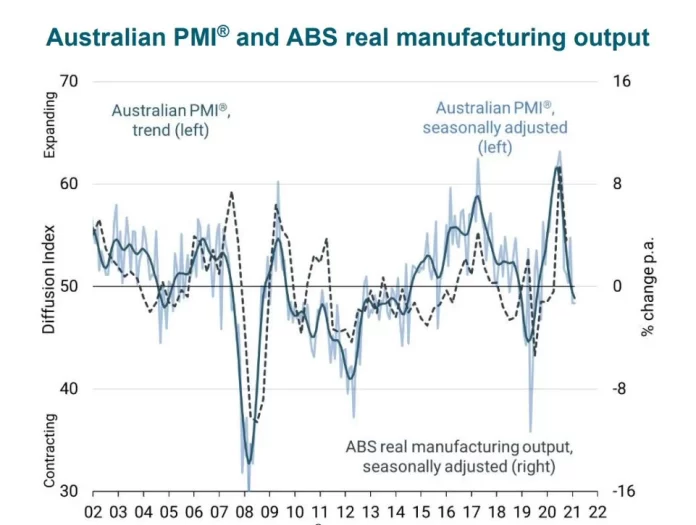
AI Group’s latest survey has found that the Australian PMI dropped by 6.4 points to 48.4 over the summer holiday period (December 2021 and January 2022), indicating weaker conditions compared with November 2021.
According to the study, six of the seven activity indices in the Australian PMI decreased in December and January, with only the sales index improving (up 1.7 points to 52.3).
Following a better performance in November, production (down 0.6 points to 51.9), new orders (down 8.0 points to 51.3), and stockpiles (down 6.1 points to 52.5) remained modestly positive.
In December and January, three of the six manufacturing sectors in the Australian PMI reported favourable conditions, with firms in the building materials (up 6.5 points to 63.4) and machinery & equipment (down 2.3 points to 53.5) sectors recording the best results.
After a brief bounce in November, the relatively big food and beverage industry is now in contraction (down 19.2 points to 38.2).
Over the holiday season, the input prices index jumped sharply (up 4.0 points to 82.3), indicating greater price increases on average, while selling prices fell from a recent series high of 68.1 but remained elevated (down 3.3 points to 64.8).
The average wages index lifted (up 1.1 points to 63.5) and remained above its long-run average (58.9 points) as staff availability was reduced with rising numbers of people isolated due to the impact of the COVID-19 Omicron variation.
Innes Willox, Chief Executive of Ai Group, said further disruptions to supply chains and reduced staff availability due to the impact of the COVID-19 Omicron variant emerged as a major constraint on many businesses over December and January.
“The fall in performance in the December-January period reversed the improvements in manufacturing conditions reported last November as activity restrictions were eased in the south east corner of the country,” Mr Willox noted.
“In contrast, the December and January period was heavily influenced by the much higher level of COVID-19 infections and the jump in the number of people in isolation.
“The performance of the food & beverages sector fell sharply with much smaller contractions reported by metal products and chemicals manufacturers. In contrast, building product producers reported a strong lift in performance and machinery & equipment manufacturers reported further gains as did businesses in the diverse textiles & paper group.
“Manufacturing employment and exports slipped into negative territory after short-lived recoveries in November. Production was broadly flat and sales edged higher. The new orders index fell steeply pointing to a reduction of confidence among businesses dealing with new implications of the COVID-19 pandemic,” Mr Willox concluded.




















